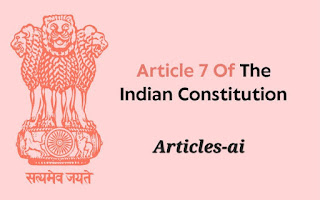The Indian Constitution, the supreme law of the land, governs the lives of over a billion people. It lays down the framework for the country's political, legal, and social structure, and is crucial in defining the rights and duties of citizens and non-citizens alike. One of the key aspects of the Indian Constitution is its provisions regarding citizenship, particularly Article 7, which deals with the rights of individuals who migrated from India to Pakistan during the partition era. This comprehensive guide aims to provide an in-depth understanding of Article 7 of Indian Constitution and its implications historically and in contemporary times.
Table of Contents
Introduction to Indian Constitution
The Indian Constitution, adopted on November 26, 1949, and enforced on January 26, 1950, is the world's longest written constitution. It comprises 395 articles, divided into 22 parts and 12 schedules, governing various aspects of the nation's political, legal, and social landscape. The constitution not only defines the powers and functions of the three branches of government – the executive, the legislature, and the judiciary – but also provides a comprehensive set of principles and provisions for the protection and promotion of the rights and liberties of citizens and non-citizens in the country.
Foundational Principles of Citizenship in Indian Constitution
Citizenship is a fundamental aspect of the Indian Constitution, as it determines the rights and privileges an individual may enjoy within the country. Citizens are entitled to fundamental rights, such as the right to equality, freedom of speech and expression, and the right to life and personal liberty, among others. Non-citizens, on the other hand, do not enjoy these rights to the same extent. Articles 5 to 11 of the Indian Constitution lay down the rules for acquiring and losing citizenship, and the rights and responsibilities associated with it.
The Essence of Article 7 of Indian Constitution
Article 7 of the Indian Constitution specifically deals with the citizenship status of individuals who migrated from India to Pakistan during the tumultuous period following the partition of the subcontinent in 1947. The article states that a person who migrated from India to the territory now included in Pakistan after March 1, 1947, shall not be considered a citizen of India. However, an exception is provided for individuals who returned to India under a permit for resettlement or permanent return issued by the Indian government. Such persons are deemed to have migrated to India after July 19, 1948, and their citizenship status is governed by Article 6 of the constitution.
Key Components of Article 7
Article 7 of the Indian Constitution has several critical elements that define its scope and applicability:
- The primary provision of Article 7 stipulates that individuals who migrated from India to Pakistan after March 1, 1947, will not be considered citizens of India.
- The exception to this rule is for those who returned to India under a government-authorized permit for resettlement or permanent return. These individuals are treated as migrants under Article 6 and are eligible for Indian citizenship.
- The issuance of permits for resettlement or permanent return is subject to a thorough investigation and verification process conducted by government-appointed officials.
- The granting of citizenship under Article 7 is not based on a six-month residency requirement, as is the case with some other citizenship provisions in the Indian Constitution.
Historical Background and Debates Surrounding Article 7
Citizenship Categories Recognized by Indian Constitution
The Indian Constitution recognizes four main categories of citizenship, as outlined in Articles 5 to 8:
- Citizenship by domicile: A person can acquire citizenship if their parents were born in India or if they have been an ordinary resident in India for at least five years. This category requires the individual to have a permanent home in India, either through ownership or parental residence.
- Citizenship for migrants from Pakistan: This category is divided into two sub-groups – those who migrated before July 19, 1948, and those who migrated after the partition. Article 7 deals specifically with individuals who migrated to Pakistan and then returned to India on resettlement or permanent return permits. Such individuals must have resided in India for at least six months before applying for citizenship.
- Citizenship for persons residing outside India: Non-resident Indians may be eligible for citizenship if they have a permanent or parental residence in India, and their parents or grandparents were born in the country. This provision requires the applicant to have a clean criminal record and to be registered with the appropriate consular representatives.
- Citizenship by birth, descent, registration, and naturalization: These provisions, detailed in the Citizenship Amendment Act 1955, further expand the eligibility criteria for Indian citizenship, taking into account factors such as birth, parental descent, marriage to an Indian citizen, and the length of residency in the country.
